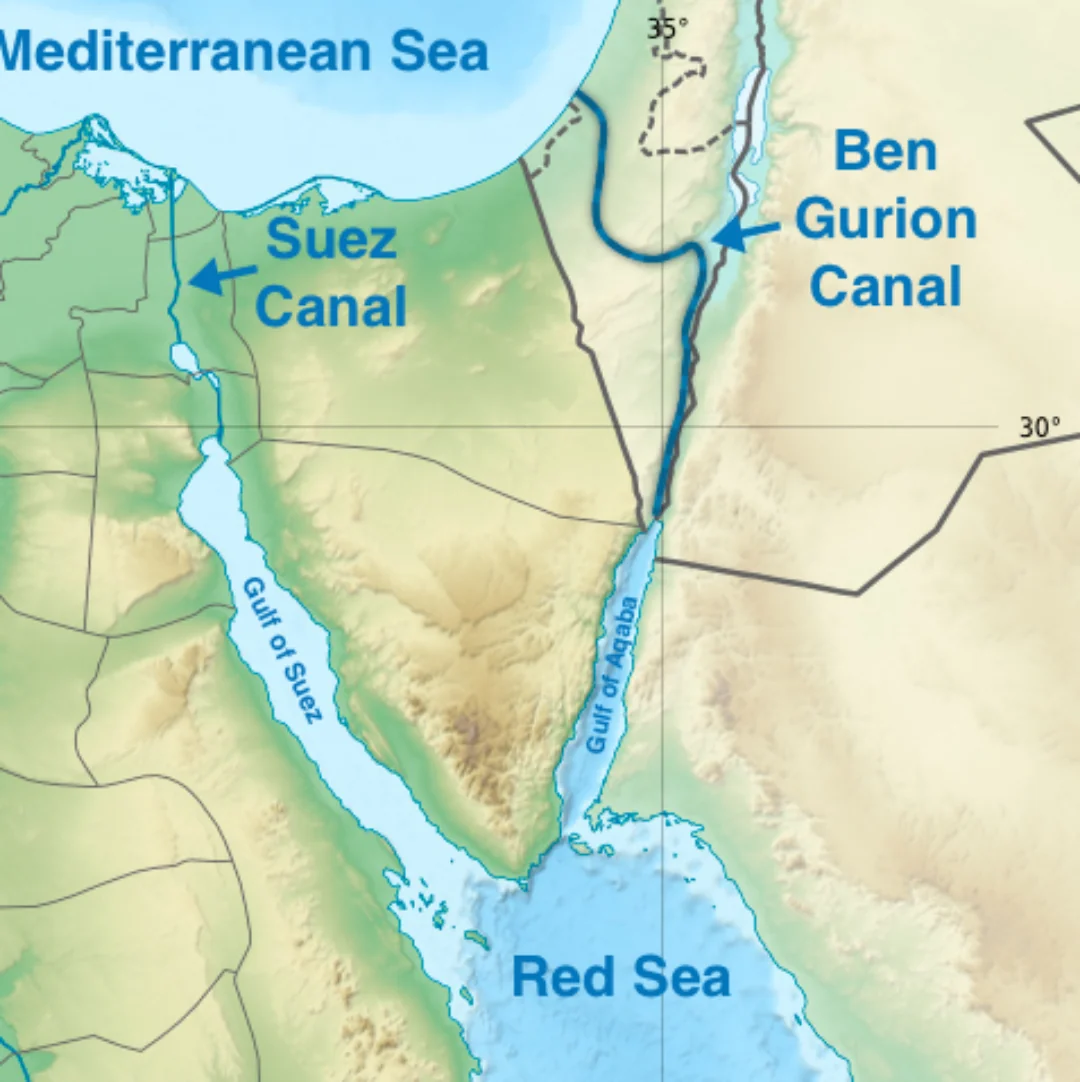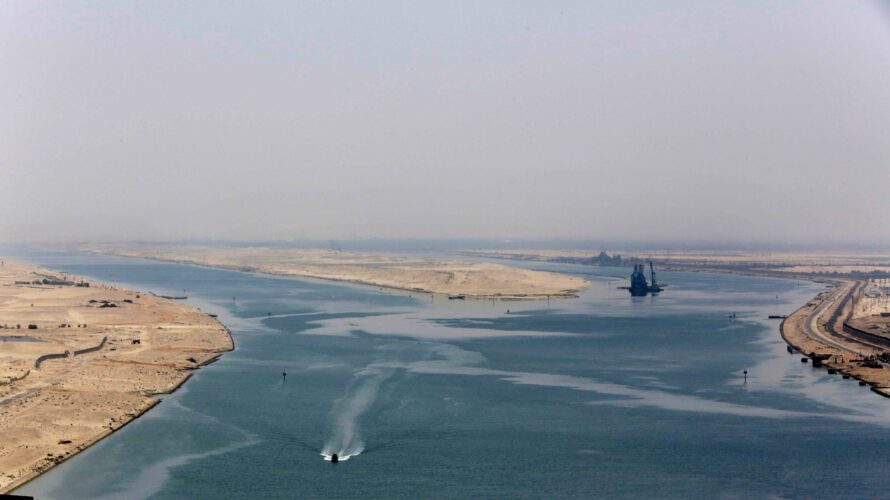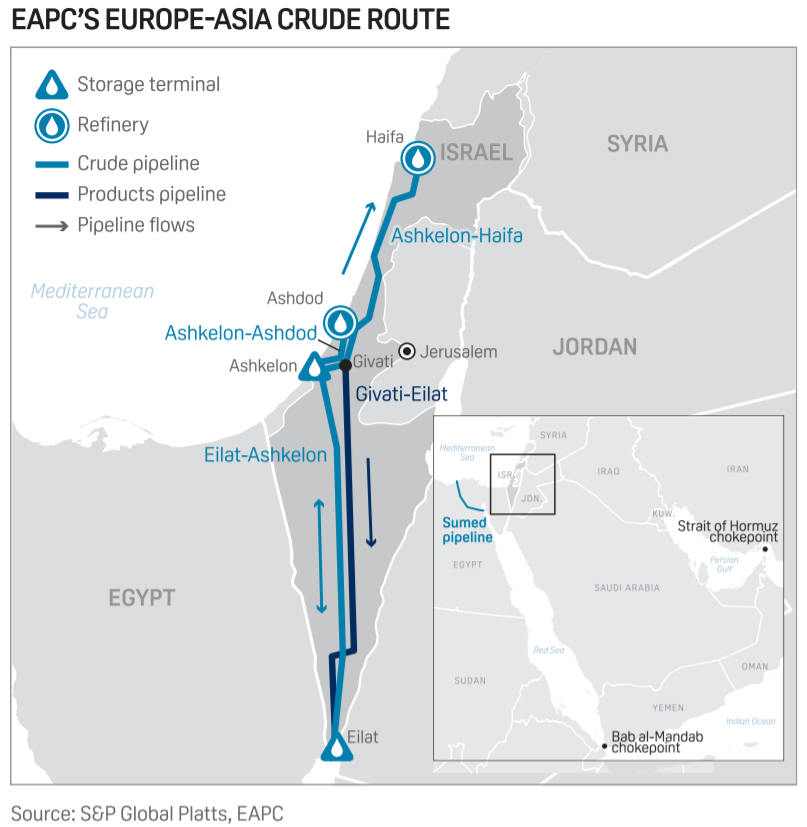Since the outbreak of the Israel-Hamas War on Oct. 7, rumors have circulated online about an alleged Israeli infrastructure project that would create an alternative to the Suez Canal, allowing Israel to control a waterway between the Mediterranean and the Red Sea.
The new canal, supposedly called the “Ben Gurion Canal” after Israeli founding father and first Prime Minister David Ben Gurion, would be a financial boost for Israel, but it would also have to run directly through the Gaza Strip.
 The waterway would begin at the Gulf of Aqaba — located at the northern tip of the Red Sea — and proceed through the port city of Eilat through the Arabah Valley for about 60 miles, remaining east of the Negev Mountains along the border of Jordan. Before hitting the Dead Sea — which is about 1,400 feet below sea level and has had to be refilled with water from the Red Sea — the canal would turn west and head across the mainland of Israel toward Gaza.
The waterway would begin at the Gulf of Aqaba — located at the northern tip of the Red Sea — and proceed through the port city of Eilat through the Arabah Valley for about 60 miles, remaining east of the Negev Mountains along the border of Jordan. Before hitting the Dead Sea — which is about 1,400 feet below sea level and has had to be refilled with water from the Red Sea — the canal would turn west and head across the mainland of Israel toward Gaza.
So, is there anything to this claim? Is this the actual reason Israel wants to evacuate Gaza and take it from Hamas? Or is this just baseless speculation from random people on the internet?
One source that many link to is a 2021 article from Frontier India, a little-known news site (which doesn’t lend much help to the claim, but regardless …).
This article claims that the Ben Gurion Canal idea resurfaced with the signing of the Abraham Accords, a treaty signed in September 2020 to normalize relations between Arab nations and Israel. It reports that on Oct. 20, 2020, the Israeli state-owned Europe Asia Pipeline Company (EAPC) struck a deal with the United Arab Emirates (UAE)-based MED-RED Land Bridge Ltd. to permit the Eilat-Ashkelon pipeline to transfer oil from the Red Sea to the Mediterranean, connecting eastern with western markets — which is actually true.
The piece then goes on to claim Israel “announced” in April 2021 that work on the Ben Gurion Canal will begin by June 2021, citing “sources” in Hebrew language publications. Valuetainment could not confirm if these publications actually exist.
But Frontier India goes on to claim that the Ben Gurion Canal will be able to handle ships going in both directions, as opposed to the Suez Canal, and will not need as much maintenance since it would have thick, mountainous walls rather than shores of sand. It claims Israel will build “cities, hotels, restaurants and night clubs” along the new waterway, which will be about “100 km longer” than the Suez Canal (193 km).
Explaining the reason behind it, Frontier India says the canal will “give Israel the freedom from blackmail arising out of access to the Suez Canal,” meaning the power that Arab nations wield over Israel by using access to the Suez as leverage. It says the new canal will also be of high importance in terms of military strategy.
Other sources that discussed the Ben Gurion Canal are The Arab Weekly, which claims that discussions about an alternative to the Suez are brought up whenever blockages or droughts occur, and Turkiye Newspaper, which insinuates that Israeli Prime Minister Benjamin Netanyahu is going to exploit the Gaza crisis to begin work on the project. While there is scant information on the project, the plan has definitely been considered before, as will be discussed below.
But first we must answer: why would Israel be looking for an alternative to the Suez Canal?
Reason Behind a ‘Ben Gurion Canal’
The Suez Canal Authority had a record revenue of $9.4 billion in Egypt’s 2022 Fiscal Year, up from $7 billion the year before. Some 25,800 ships passed through the canal in FY 2022, up from 23,800 the previous year.
(RELATED: Panama Canal Crisis – How it Impacts the World Economy)
But the Suez and its profits were not always owned by the state of Egypt. In October 1956, a conflict between Israelis and Egyptians cascaded into what historians refer to as “the Suez Crisis,” when the British and French lost control over the Suez Canal after the Egyptian government nationalized it.
The Suez Canal was created by a French diplomat in 1869 and was jointly administered by a British-French imperial corporation. By the 1950s, Egypt had already been rebuffing Britain’s military presence at the canal, and was unhappy with the existence of Israel. But when Israeli troops pushed Egyptian forces toward the canal, as the U.S. backed out on a promise to fund a dam in the Nile River, Egypt seized control over the highly important trade route.
Backed by the Soviet Union, Egypt felt empowered to charge ships high tolls in order to pay for its Nile dam. The Soviets also provided further aid when British, French, and Israeli forces attacked Egypt over it, with Nikita Khrushchev, the former first secretary of the Communist Party of the Soviet Union, threatening to blast Western Europe with nuclear missiles. The U.S. showed up and both threatened the Soviets to not get directly involved and threatened the French-British-Israeli forces with sanctions if they didn’t withdraw. In the end, Egypt kept its control of the canal and Britain and France receded into further geopolitical irrelevance.
Previous Consideration of ‘Ben Gurion Canal’
It was revealed in a document from the 1960s (declassified in 1996) that the United States considered using 520 nuclear bombs to blow through the Israeli landmass in order to create an alternative to the Suez Canal similar to the alleged Ben Gurion Canal. It was produced by the Lawrence Livermore National Laboratory, an institution funded by the U.S. Department of Energy.
The document, entitled “Use of Nuclear Explosives for Excavation of Sea-Level Canal Across the Negev Desert,” proposes creating a 160 mile long canal across Israel to as a “strategically valuable alternative” to the Suez that would “probably contribute greatly to the economic development of the surrounding area.” The author also suggests using the hypothetical canal to power a hydro-electric dam.
To create the passageway connecting the Mediterranean with the Gulf of Aqaba through the Negev desert, the paper notes, “it appears that nuclear explosives could be profitably applied to this situation.” It suggests a route that would “pass by Beersheba and the Gaza Strip,” specifically Gaza’s “coastal plain” which is described as “the least difficult to excavate” as it is “fairly close to seal level.”
After discussing the economic feasibility of the project, which it argues would only be a fraction of the ultimate pay off, the document brushes up against its “political feasibility,” recognizing “it is likely that the Arab countries surrounding Israel would object strongly to the construction of such a canal.”
The proposal came during a time when the U.S. government was contemplating the constructive use of nuclear weaponry, or “peaceful nuclear explosions” (PNE) as the U.S. Atomic Energy Commission dubbed it. The Israeli canal plan was scrapped (as was a similar plan floated for Central America) after it was discovered through tests that nuclear bombs do, in fact, damage and irradiate the environment.
But perhaps the idea of an alternative route to the Indian Ocean, a “Ben Gurion Canal,” was not forgotten about.
Watch Patrick Bet-David talk about the history, economics, and politics of the Suez Canal, the Panama Canal and more:



















Add comment